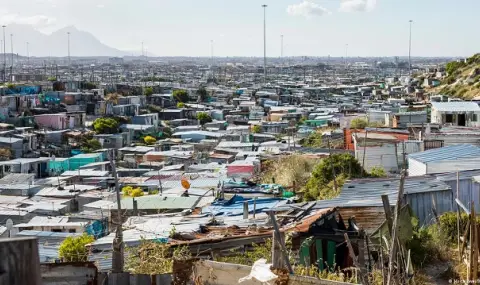Stagnant economy, corrupt politicians, widening divide between rich and poor: 30 years after the end of apartheid, South Africa can't find its way. Where did the country fail?
In 1994, there was much euphoria surrounding South Africa's first free elections, and logically they were laden with huge expectations. People lined up to cast their votes - after 27 years in prison, it was time for Nelson Mandela to be elected president.
The African National Congress (ANC), Mandela's political party and erstwhile anti-apartheid movement, still rules today. But the balance of the last 30 years in the “land of hope" is not good: the economy is in a bad state, society is divided socially, people feel misunderstood by politicians.
The gap between rich and poor is widening - even though one of the main intentions of the Mandela government was to overcome it and create equal opportunities for all. The disappointment of the unfulfilled dream is huge.
But there are also important achievements. “We managed to adopt one of the most progressive constitutions in the world, to establish independent justice, a free press, free and fair elections,", Fredson Gillenge, program manager of the section of the foundation “Rosa Luxemburg", says. in Johannesburg. In addition, he defines as a success what has been done regarding the rights of the LGBTI community, improved education and more people's access to electricity, housing and social services.
The constitution of democratic South Africa is the first in the world to prohibit discrimination based on sexual orientation. Already in 2006, the country became the fifth in the world and the first in Africa to allow same-sex marriage.
Corruption and power struggle
South Africa still has a strong and active civil society that stands up for its rights. But in recent years the country has suffered from divisions within the ruling ANC party. Struggles for power and corruption constantly set the country back.
The consequences: daily blackouts (caused by the corruption and indebtedness of the state energy company Eskom), high unemployment, crime and poverty, rising costs of living.
Youth unemployment (almost one in two South Africans under the age of 34 is unemployed) further increases social instability and discontent because it reinforces the feeling that foreigners are taking jobs away from locals, Gillenge says.
Disappointment with politicians
The ruling party has been steadily losing confidence for years, and in the upcoming elections in May it may fall below 50 percent for the first time.
Economic analyst Daniel Zielke told DV that the deep disappointment with the ANC is spreading more and more. The party is “incapable of maintaining the ethical standards imposed by Nelson Mandela", he believes.
South Africans are furious with the leadership for missing the chance to take the country to the top after its unique transition. “The efforts to unite the people into one nation, which were palpable in Mandela's early years, have now evaporated."
The damage done by Jacob Zuma
The country entered a particularly deep crisis during the presidency of Jacob Zuma, who ruled from 2009 until his resignation in 2018. During this period, he ransacked the country and almost bankrupted it through his networks of corruption. South Africa has not yet recovered, and clientelism and the shadow economy are a fact to this day, emphasizes Zielke.
The collapse of infrastructure and logistics alongside a stagnant economy is a daily reminder of the decline of what was once Africa's richest industrial nation. “The population is very worried,", assures Zilke.
The Deep Wounds of the Apartheid Era
Critical observers also ask themselves whether three decades are enough to overcome the legacy of the long and deep process of colonialism and apartheid. According to Verne Harris, director of the Nelson Mandela Foundation, society is in dire straits. “We have to ask ourselves why we didn't do everything better," he told DV.
At the beginning of the 1990s, it was clear to everyone that the healing of society, its restoration and the consolidation of democracy would take several generations. “But we allowed ourselves to be misled that we could quickly put things in order. This led in some cases to hasty decisions that did not help us," admits Harris.
Peace Initiatives
As Gillenge says, internationally, South Africa - precisely because of the war in the Middle East, its experience from the apartheid era - is trying to take an active role in the fight against oppression. That is why it offers initiatives for peace, sends troops to the countries of the region, in December 2023 accused Israel before the International Criminal Court in The Hague of violating the Convention on the Prevention of Genocide with the war in Gaza.
South Africa has realized that the traditional partnership with the West is not balanced and needs to change. “For this reason, South Africa is pushing for reforms in the UN Security Council and is a member of BRICS, where it wants to fight for fair rules and economic partnerships," says Gillenge and adds: “Probably, in the future, South Africa will occupy more active role both in Africa and in the world".
